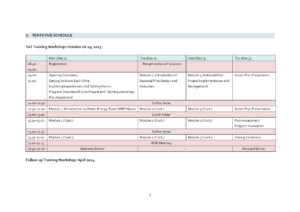
In September 2021, the United Nations Office for South-South Cooperation (UNOSSC), the Republic of Korea (RoK)’s Ministry of Science and ICT (MSIT), and the Mekong River Commission (MRC) launched a project entitled “Triangular Cooperation on Sustainable Development in the Lower Mekong Basin based on the Water-Energy-Food (WEF) Nexus.” The project, also known as the “RoK-UNOSSC Facility Phase 3” and P-LINK, is intended to strengthen access to water, food and energy for vulnerable communities living in the Lower Mekong Basin (Cambodia, Lao PDR, Thailand, and Viet Nam) through strengthening development approaches and management in these sectors. It will take integrative and multi-sectoral approaches in the application of highly demanded technologies on water, energy and food to improve the people’s livelihoods based on South-South and triangular cooperation (SS & TrC) modalities.
The 5-year project is supported by the Ministry of Science and ICT of the Republic of Korea, and the UNOSSC leads the project implementation in partnership with other institutions, including the Mekong River Commission Secretariat (MRCS), Mekong Institute (MI) and the Science and Technology Policy Institute (STEPI) of Korea and will enlist the help of RoK experts in Science, Technology and Innovation (STI).
To support national pilot implementation, the MI will organize capacity building training workshops (onsite and online) to enhance the selected participants’ knowledge of the national pilot design and indicators and equip them with advanced skills regional perspectives, and professional and personal networks to implement the national pilot. The workshops will also be used as a platform for providing interconnection between the progress and results of pilots, and discussion on advancing WEF nexus cooperation at the sub-regional level through sub-regional multi-stakeholder forum.
The training workshops are designed to enhance the selected participants’ knowledge of the national pilot design and indicators and equip them with advanced skills, regional perspectives, and professional and personal networks to implement the national pilot.
- Enhance the better understanding of WEF Nexus and national pilot design and indicators
- Equip advanced skills in the national pilot implementation
The ToT workshop will be conducted at MI Residential Training Centre, Khon Kaen, Thailand. In this course, participants will be trained in four interrelated modules:
Click here to see the full contents.
As the participants will work in cross-national groups, these activities will promote communication skills and regional collaboration and foster a professional network of contacts among participants. Specific assignments will also be provided throughout the course. The learning methodology is designed to foster a greater understanding of the training content and stimulate sharing and networking among the participants. Interactive, experiential learning will be employed. A team of experts will deliver the modules and will adopt the following methods:
- Lectures and presentations;
- Group discussions; and
- Group exercises, presentation, role play, and action plan.
All training modules and simulation exercises will be drawn from and tailored to the Lower Mekong Basin (LMB) context, focusing on practical knowledge and adult learning principles. The training will employ a participatory method linked to the realities of the LMB countries. Each training topic and module will be designed using the “integrated curriculum” approach. The salient features of the integrated curriculum are that competencies are carefully selected, support theory is integrated with skill-based practice, essential knowledge is learned to support the performance of skills, and various functional competencies (e.g., facilitation, presentation, communication skill, etc.).
As mentioned above, the program will mainly adopt a modular training approach with which the participants will go through three progressive stages: (i) Learn to Do, (ii) Do to Learn, and (iii) Share to Learn.
The training workshops will consist of three participants from Cambodia, Lao PDR, Thailand, and Viet Nam. The total no. of participants in the training is 20. The participants are required to meet the criteria below:
- Directly involve in the national pilot implementation and be able to share the knowledge and skills gained from the training workshop with other stakeholders
- Hold a university degree or an equivalent educational background with a minimum of three to five years of working experience
- Be proficient in English speaking, reading, and writing
- Have strong familiarity in cross-cultural interactions
Important criteria for participant selection are his/her commitment to (a) attend the training workshops in its entirety and (b) complete all assignments and activities. All sessions will be delivered in English.
An effective monitoring and evaluation (M&E) mechanism will be utilized to assess the progress and measure the results of the intervention. The M&E will be introduced in the pre, during, and post-stages training.
Pre-event
Selection of Participants: Before the launch of the training program, relevant information on the prospective participants’ knowledge level will be collected. The information will be used to assess and select the participants, monitor the progress, and assess the results of the intervention. Each country’s participants will be requested to prepared their draft pilot plans for discussion and refinement at the first workshop.
During event
During the event, a pre-and post-training assessment will be conducted to assess the knowledge and competencies of the participants. Pre-assessment aims to gather information on the participant’s level of knowledge. The result will be compared to the post-assessment in order to measure the improvement in knowledge and experience. Furthermore, the training M&E tools, such as the ‘mood meter,’ and the ‘Board of Directors, will be employed to evaluate day-to-day learning progress. The online after-event evaluation of the training will be conducted at the end of the training. Also, the participants will prepare an action plan to transfer knowledge back to their workplaces, provinces, and countries.
- The Mood Meter is an instrument for the daily subjective measurement of the learning atmosphere and mood of the participants. At the end of each day, the participants rated their mood as very happy, normal, or disappointed.
- The Board of Directors consists of two or three participants selected by the group on a rotational basis. The BOD provides feedback to MI facilitators and resource persons (RPs) at the end of each day on the learning contents, methodologies, and other activities related to the learning. This feedback session helps RPs and MI facilitators improve training delivery methods and strategies the next day. Every morning starts with a recapitulation of sessions where the BOD reports what they learned the previous day to the class.
Post-event
This is the knowledge transfer stage during which the participants will be required to implement individual action plans at their workplace and/or in the provinces and countries to transfer the knowledge and skill learned during the training. This could be in the form of knowledge-sharing sessions with their colleagues. The online follow-up evaluation of the training will be conducted within three-six months after the completion of the training.
Ms. Jian (Tina) Wang
Program Manager
Sustainable Energy and Environment Department Mekong Institute
Tel: + 66 (0) 4320 2411 Ext. 4104
Email: [email protected]
Mr. Chakdao Sudsanguan
Project Officer
Sustainable Energy and Environment Department Mekong Institute
Tel: +66 (0) 43 202 411 ext. 4106
Email: [email protected]



